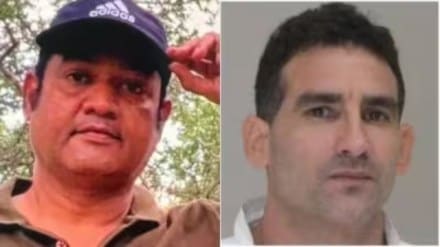The brutal killing of an Indian-origin motel manager Chandra Nagamallaiah in Dallas, US, has sparked outrage, with netizens criticising the American media for failing to give the story due prominence.
X user, James Blunt, in a strongly worded post on X, expressed disbelief at the muted coverage. “I am DISGUSTED. A hardworking Indian American was BEHEADED in front of his wife and child. WHY didn’t this get even 5 MINS of prime-time coverage? If this isn’t a national story, what is?” he wrote.
Blunt further pointed to a disturbing rise in anti-Indian hate online, questioning whether the silence from mainstream media was normalising such violence. Blunt also warned, “Are we just going to ignore it until it escalates again?”
I am DISGUSTED.
— James Blunt (@JBlunt1018) September 12, 2025
A hardworking Indian American was BEHEADED in front of his wife and child.
WHY didn’t this get even 5 MINS of prime-time coverage? If this isn’t a national story, what is?
This man’s HEAD was cut off — and the killer casually PICKED IT UP. How is this not… https://t.co/Kf33mYMGRE
Another user wrote, “When a Ukrainian refugee was killed, the US President and national media reacted immediately, but in the brutal beheading of an Indian immigrant, the same urgency, outrage, and compassion were missing! Does the value of an immigrant’s life depend on their race, background, or nationality?”
A third user on X also questiomed the Indian diaspora’s silence over the incident. His post on X reads, “Why has US media blacked out horrific beheading of #ChandraNagamallaiah in Dallas by Cuban Yordanis Cobos-Martinez in broad daylight in front of his wife & child? Why is Indian diaspora quiet? If you can condemn #CharlieKirkshot then why not Chandra?”
https://t.co/UneIfpQEvy. Why has US media blacked out horrific beheading of #ChandraNagamallaiah in Dallas by Cuban Yordanis Cobos-Martinez in broad daylight in front of his wife & child?
— deepak (@Thiran_21) September 12, 2025
Why is Indian diaspora quiet?
If you can condemn #CharlieKirkshot then why not Chandra?
US Congressman Ro Khanna also condemned the crime, calling it a “horrific” act and demanding accountability. He pointed out that the accused, 37-year-old Cuban national Yordanis Cobos-Martinez, had a history of violent crime and child endangerment yet remained free on American streets. “The murderer had multiple prior arrests… he should not have been free,” Khanna said. His statement also reignited debates over immigration enforcement, with the Department of Homeland Security confirming Cobos-Martinez was an undocumented immigrant under a final deportation order.
How did the US media cover Dallas murder?
The murder has sparked widespread attention, but the way US media outlets framed the incident varied significantly.
NBC News chose a crime-focused angle, stressing the victim’s interaction with the suspect, the refusal to allow use of a broken washing machine, which allegedly triggered the attack. Similarly, ABC News underlined the gruesome brutality, focusing on the charges of beheading and the sensational nature of the killing.
CNN, however, adopted a policy-driven perspective, centring its coverage on immigration enforcement and ICE’s role in handling the suspect’s status. The Department of Homeland Security went further, issuing a statement with official and legalistic language, branding the accused as a “depraved criminal illegal alien.”
The NYT highlighted Cobos-Martinez’s criminal history, his immigration status as a Cuban national with a pending deportation order, and challenges faced by US immigration authorities due to Cuba’s refusal to accept him back.
Meanwhile, YouTube clips and local Dallas media delivered raw crime details, with visuals and urgent reporting, reflecting the shock within the community. Outlets like WFAA highlighted the immediate manhunt and the swift arrest of the suspect.
The outlets basically converged on two themes – the shocking violence and the immigration controversy shaping the discourse.
What do we know about Dallas motel killing?
Court records reveal chilling details of the crime. Chandra Nagamallaiah, 50, manager of a Dallas motel, was allegedly attacked with a machete after a dispute involving a broken washing machine. Authorities say Cobos-Martinez became enraged when Nagamallaiah instructed him, via a translator, not to use the appliance. Security footage reportedly shows the accused repeatedly stabbing and slashing the victim, even as Nagamallaiah tried to flee. His wife and son attempted to intervene but were unable to stop the assault. According to the affidavit, Cobos-Martinez continued until he had decapitated Nagamallaiah, later disposing of the severed head in a dumpster.
The Department of Homeland Security confirmed that Cobos-Martinez had been held in ICE custody earlier this year, but was released after Cuba refused to accept his deportation due to his criminal record. This revelation has fuelled criticism of the US immigration system, with some linking the case to wider debates over undocumented migrants and public safety.
